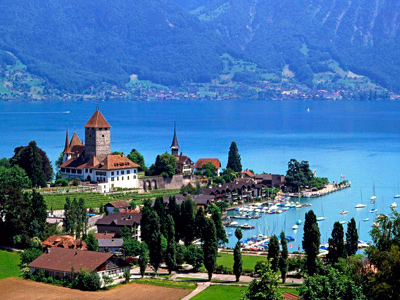| Official Name: | Swiss Confederation | Population: | 7.7 million people |
| Capital: | Berne | State language: | German, French, Italian, Romansch |
| Form of Government: | Federative Republic | Administrative division: | Switzerland consists of 26 cantons |
| International phone code: | 41 | Time difference with Moscow: | -2 hours |
| Monetary unit: | Swiss Franc (CHF) | Rate: | 1 CHF = 97.67 RUR |
EDUCATIONAL INSTITUTIONS
- Summer and Vacation Programs
- Secondary Education and Pre-University Preparation
- Undergraduate Courses
- Postgraduate Courses and MBA

INFORMATION ABOUT SWITZERLAND AND ITS EDUCATION SYSTEM
General information about the country.
This is a country in West Europe. It has border with Germany on the north, with Italy on the south, with France on the west and with Austria and Lichtenstein on the east. Population - 7,7 mln. people. The official languages in Switzerland are German, French, Italian and Roman (the last one is considered to be official only for those who speaks Roman). The capital of the country is Bern. Major cities are Zurich, Geneva, Basel, Bern, Lausanne. Switzerland is a parliamentary republic. The country's territory is 41284 square kilometers. Switzerland is the richest country in the world and one of the major banking and financial centers (Zurich is the third world currency market after New York and London).
Higher education in Switzerland.
In Switzerland there are 12 state universities: the seven "classic" cantonal universities - in Basel, Bern, Fribourg, Geneva, Lausanne, Neuchâtel, Zurich and St. Gallen - two small cantonal universities in the status of the University - College of Lucerne and the Universita della Svizzera Italiana in Lugano, as well as two special polytechnic schools EPF Lausanne and ETH Zurich, where they study engineering sciences and architecture.
Teaching is based on the language of the region: in German - in Basel, Bern, Zurich, Lucerne and St. Gallen, in French – in Geneva, Lausanne, Neuchâtel, in Italian - in Lugano in two languages (German and French) - Fribourg.
Swiss universities obey to both federal government and cantons, so there is no common education system. Mandatory minimum exists only for the faculty of engineering, law, economics and management, agriculture and design. Programs for all other specialties vary depending on the canton in which the institution is. Universities regulate the number of students using the exam after the first year, the most complex. After this exam 50% of students will be eliminate. Students have the same exam after the second year of study. After 2-3 years of advanced training a Licentiate degree (Lizentiat) or Diploma (Diploma) are awarded. These degrees correspond to the master's degree. Next level of study – Doctoral degree (PhD) – have to be studied for 3 more years. The academic year at universities in Switzerland is divided into two semesters. Winter semester begins in mid-October and lasts until early March. Spring semester begins in mid-April and ends in mid-July.
Admission to Swiss universities is produced in accordance with the adopted system of competitive selection. Entrant submits documents to the university, where he would like to study and waiting for a decision admissions. Since the Swiss universities are taking to study students from abroad, the selection committee examines not only the academic performance of applicants, but also match the level of their education to Swiss standards. In some cases, students from abroad are offered to take a preparatory course in order to be accepted to the university.
Percentage of foreign students in Swiss universities is quite high: on average - about 18%, and the University of Geneva - up to 33%.
In order to enroll in a state university, foreign students must be in perfect command of German, French or Italian and have an excellent pass the difficult entrance exams, based on educational standards.
Collection of foreign students at the Faculty of Medicine is practically impossible: the medical profession is so popular that the competition for this specialty is very large. Dental and veterinary faculties are also very difficult to enter for foreign students.
Therefore, private Swiss institutions is mainly available for foreigners in Switzerland, which are represented by private universities, hospitality, travel, sports business and private business schools: Les Roches International School of Hotel Management, Glion Institute of Higher Education, European University etc.
Private Swiss universities are teaching in English and do not require the exam in the specialty for foreigners. The main requirement for admission - the presence of Russian high school diploma and proficiency in English. Highest entrance requirements for applicants from Russia impose universities of German-speaking part of the country. To enter the first year, student must complete a minimum of two courses of a Russian university and pass a special single examination for foreigners in the selection committee in Fribourg. For admission to the University of Lausanne, Geneva and Neuchatel, where students study in French, Russian high school graduates with good (no triples) school-leaving certificate is sufficient to pass a single exam.
Higher academic education in Switzerland provides the following training programs:
- 1. Bachelors Degree (3, 5 years of study)
2. Graduate programs (length of study up to 1, 5 years). Programs are designed for those who already have higher education and who want to change specialty.
3. Business program MBA (Masters of Business Administration). 1 year of study.

 +7 (495) 228 03 00
+7 (495) 228 03 00
 Switzerland
Switzerland


